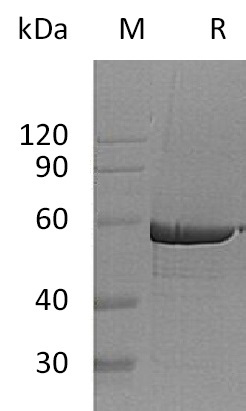 Your shopping cart is currently empty
Your shopping cart is currently empty
G6PD Protein, Human, Recombinant (His)
Glucose-6-Phosphate 1-Dehydrogenase (G6PD) is a cytosolic enzyme that belongs to the glucose-6-phosphate dehydrogenase family. G6PD participates in the pentose phosphate pathway that supplies reducing energy to cells by maintaining the level of the co-enzyme nicotinamide adenine dinucleotide phosphate (NADPH). G6PD produces pentose sugars for nucleic acid synthesis and main producer of NADPH reducing power. NADPH in turn maintains the level of glutathione in these cells that helps protect the red blood cells against oxidative damage. It is notable in humans that G6PD is remarkable for its genetic diversity. G6PD deficiency may cause neonatal jaundice, acute hemolysis, or severe chronic non-spherocytic hemolytic anemia.

G6PD Protein, Human, Recombinant (His)
| Pack Size | Price | USA Warehouse | Global Warehouse | Quantity |
|---|---|---|---|---|
| 5 μg | $112 | 7-10 days | 7-10 days | |
| 10 μg | $183 | 7-10 days | 7-10 days | |
| 20 μg | $292 | 7-10 days | 7-10 days | |
| 50 μg | $545 | 7-10 days | 7-10 days | |
| 100 μg | $792 | 7-10 days | 7-10 days | |
| 200 μg | $1,150 | 7-10 days | 7-10 days | |
| 500 μg | $1,900 | 7-10 days | 7-10 days | |
| 1 mg | $2,730 | 7-10 days | 7-10 days |
Product Information
| Biological Activity | Activity has not been tested. It is theoretically active, but we cannot guarantee it. If you require protein activity, we recommend choosing the eukaryotic expression version first. |
| Description | Glucose-6-Phosphate 1-Dehydrogenase (G6PD) is a cytosolic enzyme that belongs to the glucose-6-phosphate dehydrogenase family. G6PD participates in the pentose phosphate pathway that supplies reducing energy to cells by maintaining the level of the co-enzyme nicotinamide adenine dinucleotide phosphate (NADPH). G6PD produces pentose sugars for nucleic acid synthesis and main producer of NADPH reducing power. NADPH in turn maintains the level of glutathione in these cells that helps protect the red blood cells against oxidative damage. It is notable in humans that G6PD is remarkable for its genetic diversity. G6PD deficiency may cause neonatal jaundice, acute hemolysis, or severe chronic non-spherocytic hemolytic anemia. |
| Species | Human |
| Expression System | HEK293 Cells |
| Tag | C-6xHis |
| Accession Number | P11413 |
| Synonyms | Glucose-6-Phosphate 1-Dehydrogenase,G6PD |
| Amino Acid | Ala2-Leu515 |
| Construction | Ala2-Leu515 |
| Protein Purity | Greater than 95% as determined by reducing SDS-PAGE. (QC verified)  |
| Molecular Weight | 55-62 KDa (reducing condition) |
| Endotoxin | < 0.1 ng/µg (1 EU/µg) as determined by LAL test. |
| Formulation | Supplied as a 0.2 μm filtered solution of PBS, pH 7.4. |
| Stability & Storage | Lyophilized powders can be stably stored for over 12 months, while liquid products can be stored for 6-12 months at -80°C. For reconstituted protein solutions, the solution can be stored at -20°C to -80°C for at least 3 months. Please avoid multiple freeze-thaw cycles and store products in aliquots. |
| Shipping | Shipping with blue ice. |
| Research Background | Glucose-6-Phosphate 1-Dehydrogenase (G6PD) is a cytosolic enzyme that belongs to the glucose-6-phosphate dehydrogenase family. G6PD participates in the pentose phosphate pathway that supplies reducing energy to cells by maintaining the level of the co-enzyme nicotinamide adenine dinucleotide phosphate (NADPH). G6PD produces pentose sugars for nucleic acid synthesis and main producer of NADPH reducing power. NADPH in turn maintains the level of glutathione in these cells that helps protect the red blood cells against oxidative damage. It is notable in humans that G6PD is remarkable for its genetic diversity. G6PD deficiency may cause neonatal jaundice, acute hemolysis, or severe chronic non-spherocytic hemolytic anemia. |
Dose Conversion
Calculator
Tech Support
| Size | Quantity | Unit Price | Amount | Operation |
|---|

Copyright © 2015-2026 TargetMol Chemicals Inc. All Rights Reserved.



